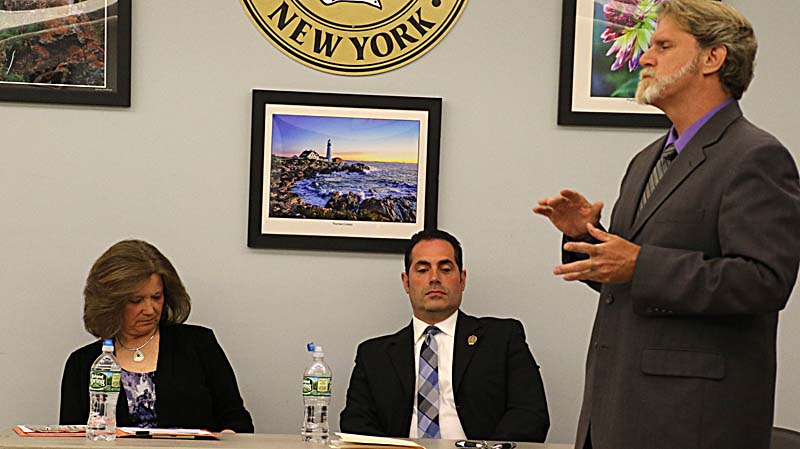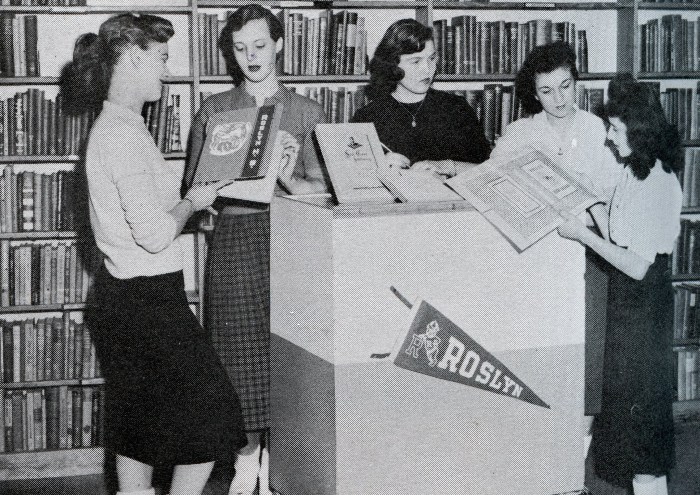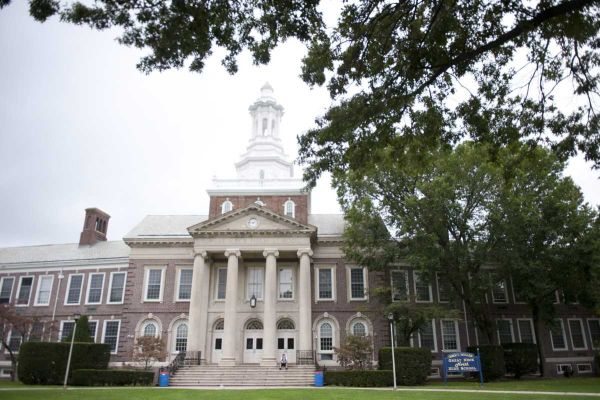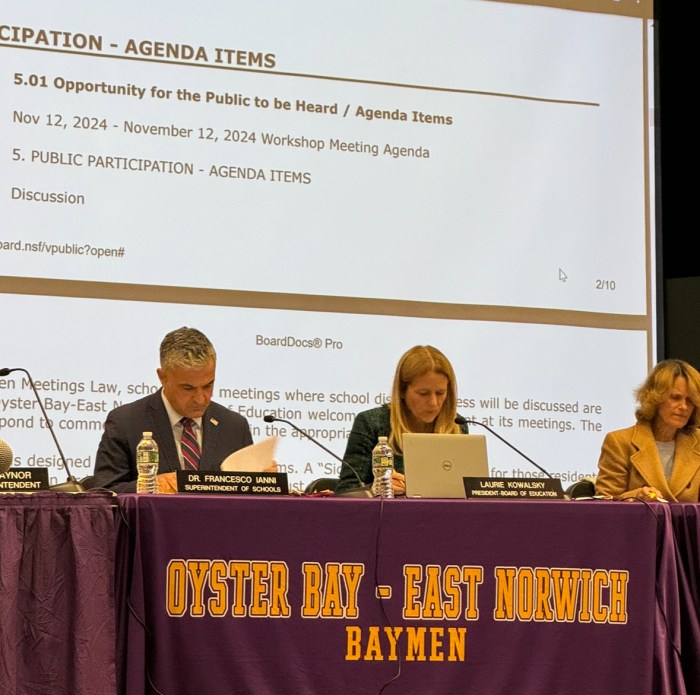Budget and board vote May 16 at Howitt Middle School

The Concerned Citizens Association of Farmingdale (CCAF) hosted a meeting on May 4 at Ellsworth Allen Park to hear from the three Farmingdale School District Board of Education (BOE) candidates running for two open seats on the board. Several dozen residents were on hand, including a number of BOE members and Assistant Superintendent for Human Resources and Administration Glen Zakian, the former high school principal.
Voters will have their say at the Tuesday, May 16 budget and board election, to be held from 6 a.m. to 9 p.m. at the Weldon E. Howitt Middle School East Gymnasium, 70 Van Cott Ave., Farmingdale.
The Budget
District Superintendent for Business Paul Defendini opened the evening with a discussion of the $162.3 million 2017-18 budget. It represents a 2.15 percent increase over the 2016-17 budget, but comes in under the state-mandated tax cap. raising the levy by .83 percent.
According to Defendini’s presentation, the spending plan maintains all programs and services, and “strengthens our current financial condition.”
Voters will also be asked to approve Proposition No. 2, to use up to $5 million in Capital Reserve Funds to reconstruct bathrooms at schools across the district. Proposition No. 3 is to pass the annual budget for the Youth Council. Neither will have an effect on the tax levy.
In a budget letter to residents, Defendini and schools Superintendent John Lorentz noted that “On the expenditure side, we continue to see increasing health insurance costs, a burden being felt by all Americans. Fortunately, these increases are currently being offset by decreasing pension rates, and will be further offset in the future as a result of the retirement incentive. The amount of participation in this incentive will allow the district to realize an immediate savings of over $2,500,000 in recurring contract salary expense for 2017/18, and approximately $500,000 in related pension costs and payroll taxes. These savings will allow us to support instructional and interscholastic programs, maintain class sizes, and secure our financial condition.”
CCAF President Tina Diamond then called upon the candidates to make their pitches, starting with current board President Ralph Morales, board member John Capobianco and aspiring member Arlene Soete.
Ralph Morales

Ending his first three-year term, Morales has four children currently enrolled in the district, and another who graduated in 2014. The Manhattan-based trial lawyer is second vice president of the Farmingdale Police Activities League and member of its executive board. He’s had long involvement with the PAL as a coach and volunteer in its dek hockey, football and baseball programs.
Morales said that through his involvement with the PAL and BOE, he has learned that the lesson to be imparted to athletes and students is, “no matter what your level of ability, we want to give you the opportunity, and no matter who you are, you can maximize the opportunity.”
The administration and board, he noted, must “enpower our students so they understand, if you’re on top of the class, if you want to become a rocket scientist—and we have a kid studying rocket science at an Ivy League school—we’ve got that for you. If you’re in the middle, we’ve got opportunities for you. We have to engender a sense of responsibility and self worth in students.”
“We as a board have the awesome responsibility to serve as role models to our students,” he affirmed. “We have so much to offer these children. I’ve learned so much from former board members, all good people. It’s been a privilege and real honor to serve with my fellow board members, and I want to continue serving.”
Morales pronounced himself loyal to his family, and by extension “all the kids in the district. I’m fiercely loyal to this district and this administration because I honestly believe they have the best interests of the kids at heart. And I’m fiercely loyal to the board because I want us to move forward and work together to achieve for our collective kids. Because whether you are a board member or someone who just lives in the district, these are our kids.”
John Capobianco

Capobianco related how he started attending BOE meetings after being shocked by the first school tax bill he received. He ran for the board and won in 2008. He is seeking his fourth three-year term.
“The line is tell everyone is, ‘You should spend time in public service, because your mind will be blown. All your illusions about how a municipilaty or school district are run will be destroyed wen you spend your first year on the board.’ ”
The lifelong resident of Farmingdale and member of the Class of 1982 said he has been active in the district’s legislative action committee, whose aim is to get the district a fair share of state aid in a system that favors New York City and upstate counties at the expense of Long Island districts. During his tenure, he noted, the board got $700,000 in tax refunds back to residents and a $350,000 rebate from Long Island Power Authority for the district’s energy conservation measures, which added up to $13 million. He also fought for BOE members to be able to sit in classroom and watch the Common Core implementation in action.
Capobianco wants to address the issue of poverty in the district, noting that 24 percent of students get no-cost or reduced-cost lunches. He also wants to change the mindset wherein only the top 20 percent and special needs children get the bulk of the attention; the vast middle of the student body also needs to be addressed. In addition, he has been a longtime advocate for bringing solar power to the district and wants another term to be able to see its implementation.
“Because it’s not just about the children. It’s about everybody,” he stated as several “thank yous” rang out from the audience. “I’m always looking out for the taxpayer. We all have to work together and we all have to be understanding of other people’s situations.”
In his campaign letter, Capobianco noted that since 2008, students “have won the Science Bowl, Robotics competitions and Northrup Grumman Engineering challenges, but we still lag behind the county average and much more work needs to be done to improve the academic situation.”
He concluded, “My work is not done. I’ve got at least three more years before I compeltely lose my mind. If you give me and opportunity to serve another three years, I’ll continue beating the bushes, making connections and watching your pocketbooks.”
Arlene Soete

Soete, her husband Bernie (a school administrator) and their two daughters all graduated from Farmingdale High School and she related how she was so homesick, the family gave up a nice waterfront home in a nearby community to move back to her native village. Soete, who holds certifications in school administration, is director of St. Luke’s Early Childhood Education Center in Farmingdale.
She created the Walk of Champions at the high school and has sold more than 250 bricks to raise money for a scholarship fund. She is a member of the district’s Safety Committee and member of the county’s Community Emergency Response Team.
During her career in education, Soete said she’s had to deal with numerous challenges, among them children with autism and a burdensome 120-mile commute to Southampton. She went through all those arduous things, she said, “because it’s all about the children.”
And even as she got ribbing from her friends for running to take on the often thankless task of being on the school board, she went back to that expression.
“I’m very proud to call myself a Daler,” she said. “With rising levels of achievement in academics, the arts and athletics, Farmingdale continues to be a leader among Long Island’s school districts. My goal as a board member will be to promote student achievement.”
She concluded, “So why am I running for a seat on the board? Because I want to help children. At the end of the day, they’re my children. I might not have the expertise when it comes to [district finances] and time on the board, but I have lots of expertise when it comes to the children.”
The Questions

Diamond opened the floor up for questions and Phil Strehl, head of the village’s American Legion chapter, asked, “What can you do differently to improve the educational process? What can you do to make life better for our kids?”
Soete said, “I’ll bring a lot of reality to the school board. Working as social worker, I spend a lot of time with families that are struggling with everything I know taxes and contracts are important. and I’ve sat through wonderful presentations about our budget. They’re so important because we have to run the district. But we can’t lose sight of why we’re doing all this. Why I am doing all this at this point in my life? My children are gone, they graduated. I don’t have children going to school and I could just walk away. I want to make sure that the current students get to graduate are getting it. I would like to see more kids be ready for college, not just academically, but emotionally and socially and feel good about themselves.”
She added, “And I would bring my life experiences, my educational background and my social work experience.”
Morales answered, “Four years ago, I probably would have been in the same position, [asking], ‘The district isn’t doing enough. What can we do to get better?’ I’ve now had three years on the board and I’ve seen the inner machinations of what goes on in the district and administration. So the question is not, ‘What can we do to improve?’ but should be, ‘What can we do to let the community know of all that we do that’s good?’ Because there’s so many opportunities.”
Morales praised former principal Glen Zakian, saying that “at the high school there was such a revitalization a revival of pride. Mr. Zakian and and his staff worked so hard to give these kids opportunities.
“What our parents need to understand, and what the board can surely attest to, is that we….offer so much to the children and our students are achieving great things,” he added. “Can we improve? Absolutely.”
Morales touted the “bring your device to school” program that has enhanced interactivity. He confessed that he was skeptical at first, but now was enthusiastic,
“Farmingdale is a vanguard for this notion of ‘bring your own device,’ and we need to refine that because social media is very powerful and very dangerous,” he concluded. “We have to, as parents and administrators, hammer home to our children that with these devices comes a lot of responsibilities. We need to refine and improve this notion of interactive learning, which I think is phenomenal.”
“The best thing the board can do is stay out of the administration’s way,” stated Capobianco. “The administration is innovative and well respected in the tri-state area. We have people coming from two states away to attend our conferences. Every year we meet with the directors and we ask, ‘What can we do?’ and they answered, ‘Just keep doing what you’re doing and support the administration.’ It doesn’t mean we don’t pay attention to them. It doesn’t mean we let them do whatever they want to do, but they’re the innovators, they’re the educators, they’re the day-to-day people.”
Capobianco reiterated that his role is to make connections.
“Several weeks ago I attended a meeting at Republic Airport and met with executives from Talon Air. They have an internship program there with the Wyandanch school district. I asked, ‘Why can’t they do it with Farmingdale?’ So, they’re exploring that option right now.”
A self-employed landscape gardener, Capobianco touted his association with Farmingdale Village revitalization plans and the cultural arts committee, which he chairs.
“I get people with great ideas in touch with each other and let them run with it,” he said. “I make connections. And that’s what I’ll continue to do.”
Strehl also asked, “Do we teach respect for the flag and Americanism? We seem to be getting away from that.”
Diamond agreed with Strehl and asked Capobianco if the district still teaches civics classes. He deferred to Zakian, who stated that the 11th grade social science curriculum included U.S. history. Diamond asked if everybody takes the course and Zakian answered that its required for graduation and includes a Regents exam.
A resident asked about Common Core and Morales said the program “had good intentions, but the way it was rolled out and implemented was very sloppy. It puts teachers in the untenable position of asking themselves, ‘Am I going to educate the children, or am I going to teach to the test?’ Also, the teacher’s evaluation is tied to the test results. It puts teachers in a tough spot. As far as changing it we’re in a difficult position because the state makes [policy].”
Morales urged that, “We can advocate. The best things to try to do is come to a common ground. We need to come up with a better system because it’s not working right now. I’m not against change, but I’m against change for change’s sake. [Common Core] has to be changed to benefit the children.”
Capobianco said the idea behind Common Core was to create citizens who were educated and able to think critically.
“New York State was offered $700 million to adopt Common Core in 2010 and we as a board had to rush to adopt Common Core to get our part of the grant…[which] was $40,000.”
Turning to Defendini he asked, “Paul, have we gotten the check yet?”
Defendini indicated the answer was negative, and Capobianco affirmed that the for-profit testing company that designed the test got the bulk of the money.
Soete thought that Common Core could be added to politics and religion as topics to be avoided at dinner. With her husband as an assistant principal and her daughter as a new teacher, she said conversations on the topic “could be a minefield. There’s three of us sitting around the table with three very different views on whether it’s good or not. It’s had a negative impact, in my opinion. I like to go back to the basics of ABCs and 123s.”
She concluded, “Sometimes you feel you’re fighting a losing battle against the state, but you can’t give up.”
For more, visit farmingdaleschools.org.





























